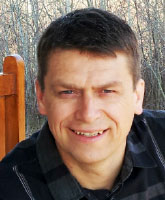Isaiah 55:8–9
I learned a concept back in 1984 during a first-year geography class at the University of Saskatchewan that has fascinated me ever since: fluvial geomorphology. Try saying that five times fast! Although fluvial geomorphology isn’t a theological term, it can help us understand some things about how God works in our lives.

The concept isn’t difficult. “Fluvial” has to do with water and its effects. “Geo” is a prefix that comes from a Greek word used to refer to the earth or land forms. “Morph” is about change or transformation. And lastly, “ology” is a suffix that identifies a field of study. When you put it all together, you get a term that simply means the study of the meandering of rivers.
If you visit any riverbank in your area, you’ll immediately see the effects of fluvial geomorphology. It’s happening all the time and is especially impressive when you’re examining the river’s winding pathway from an airplane at 10,000 feet. The water that flows on the outside of the bend flows fastest, continually carving away the riverbank and depositing silt on the slower, inside part of the curve. Rivers constantly change their course, but casual observers seldom notice the impact.
The twists and turns of our lives
This is where the geological term has spiritual application. Humans like to design systems, construct plans, and perceive our lives in linear fashion. But we know from experience that life is never linear.
We meander. Constantly.
The beauty and wonder of our God is that he can take our meandering lives and give them greater purpose and impact than we may ever notice or understand. Transformation occurs at the intersection of the human and the divine. We live our lives, make choices, mistakes, decisions, and plans – and God is able to use it all for his bigger purposes.
Two passages of Scripture speak to this interplay. The writer of Proverbs says, “We can make our plans, but the Lord determines our steps” (16:9, NLT). And the prophet’s words in Isaiah 55:8–9 (below) are well-known, reminding us that God has bigger purposes for our lives than we can ever fully see or understand.
God has given us the freedom and ability to make choices and choose our path. Yet God is still sovereign and in control. These are two seemingly competing truths. But within the tension is a biblical truth that gives me great comfort.
God will use us in more ways than we can see or understand, as we allow his Holy Spirit to do his work, slowly carving and reshaping our lives and circumstances. We have an unmistakable part to play, yet the Lord will weave our life experiences together into his bigger kingdom purposes.
Dramatic curves
There’s another spiritual application that can be made from studying fluvial geomorphology. Eventually, some parts of the river will curve so dramatically that an entire section will be cut off and bypassed altogether. What’s formed is called an oxbow lake. It’s still part of the landscape, but no longer part of the river.
Similarly, God can bring about such radical transformation in us that past circumstances – such as bad decisions, mistakes, pain – are no longer part of the flow of our lives.
They may still be a feature of the landscape, but they no longer define us. By God’s grace and through his Holy Spirit, we are made completely new.
So as we sit by the river this summer, watching the water zigzag along, let’s be encouraged – God is at work in our meandering lives!

—Bruce Enns is lead pastor of Forest Grove Community Church, Saskatoon.